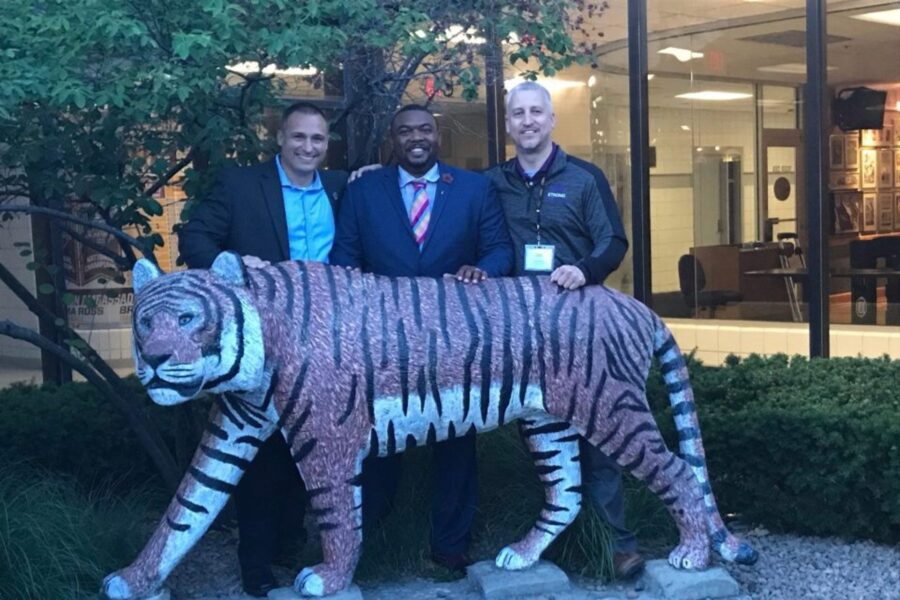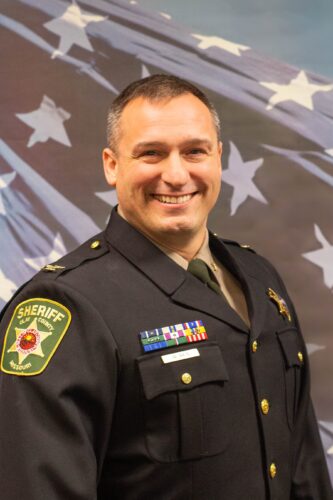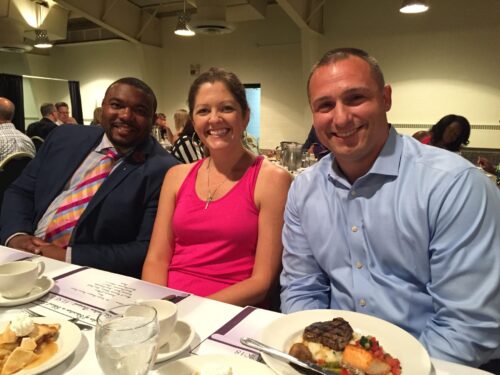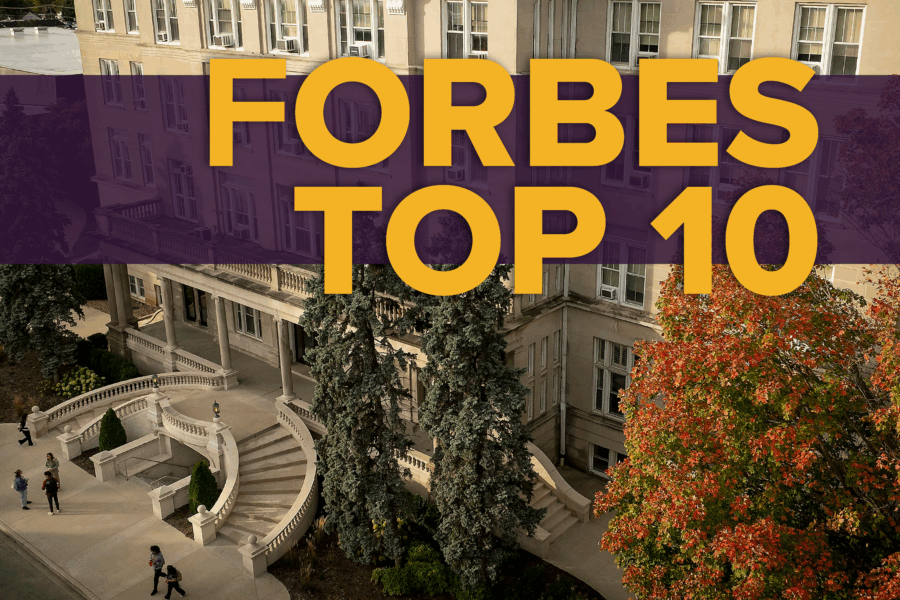
Being a leader in today’s complicated world
“I had a rough childhood and dropped out of high school when I was 16,” says Will Akin ’20 Ed.D. “I had to help support my mother and brother.” As life in his neighborhood grew worse for Will, he began to think about joining the U.S. Army to get his life back on track. But to enter the Army, he had to earn his GED (General Education Development, a high school equivalency credential).
Will accomplished that goal and served eight years in the U.S. Army. He credits the Army for saving his life. He went on to earn his associate’s, bachelor’s and master’s degrees. What was next for him? He began to think about earning a doctorate degree. 
“I was teaching some courses as an adjunct professor at MidAmerica Nazarene University,” Will says. “I realized I was the only adjunct who didn’t have a doctorate. So I started looking for a program. I looked for two years before I found Olivet’s doctoral program with the emphasis on ethical leadership.”
Fresh Definition of Leadership
Will admits that when he first heard the term ethical leadership, he considered that an oxymoron. He had already seen a lot of the world’s definitions of leadership. In addition to his service in the U.S. Army, he had served as a police officer, a private security contractor in Afghanistan and a project manager. But he knew there must be more he needed to add to his skill set and knowledge if he wanted to be a successful leader.
“I was more nervous about entering Olivet’s Ed.D. program than about anything I’ve ever done before,” he says. “I felt like I wasn’t smart enough. This looked more challenging to me than anything I ever did in Afghanistan.”
At the time he entered the Ed.D. program, Will was the Captain, Division Commander, Emergency Preparedness Division, County Emergency Manager in the Clay County (Missouri) Sheriff’s Office. “When I announced my enrollment in the program, everyone was so supportive,” he recalls. “Then my anxiety set in. What if I can’t do it? What if I don’t finish?”
Holding a doctorate degree is very unusual for a leader in the field of law enforcement. And studying ethical leadership is even more unusual. In the State of Missouri alone, there are currently 115 sheriffs, and Will is one of the two with a doctorate degree.
Taking the Next Steps
In such a demanding career, Will knew he would have more challenges in the program than he could even imagine. He had to find ways to accomplish his goal.
“We turned one of the bedrooms in our home into an office for me to use while I was in the program,” Will says. “I remember hearing my wife and son laughing and having a good time together outside the door. I felt like I was stuck in that room and missing out on family fun. But I knew I had to stay focused.”
Will quickly realized that he couldn’t do the program alone. “God guided me and supported me all the way,” he says. “At work, I relied on my staff to pick up some extra projects, and they didn’t miss a beat. My Ed.D. cohort was always so encouraging and helpful.”

One of Will’s greatest realizations as a student in the program was his lack of understanding that leadership was supposed to be ethical. “Through my studies in the program, I now understand that there are different types of approaches, theories and practices in leadership,” he says. “And I know the difference when a leader is guided by leadership principles that Jesus models for us.”
Will’s dissertation topic was on multi-generational perspectives of the law enforcement environment. He still recalls the words of Dr. Houston Thompson — program director at that time — to him after he had defended his dissertation: “Will, from this point on, you are a subject matter expert on this topic.”
Stepping Up to the Next Level of Leadership
New doors began to open for Will, including his run for Sheriff of Clay County just a few months after receiving his Doctor of Education in Ethical Leadership degree from Olivet. “I had no intention to run for sheriff,” he says. “My doctorate degree did help me stand out among the other candidates. I was elected by a vote of the people, and I don’t take that lightly. Earning the people’s trust is the most important part of this job for me. I’m now the only nonpartisan sheriff in Missouri. I serve a diverse community, and I have to make the right decisions that serve everyone.”
As sheriff, Will is a leader for his department, community and state. He serves on several community boards and committees. He is a husband and the father of three adult sons. He teaches for the National Sheriffs’ Institute and the Northwestern University Center for Public Safety. In every aspect of his life, Will continues to use what he learned as a doctoral student at Olivet.
“I’m much better at objective thinking and listening,” he says. “I now take time to step back and look at situations critically. I can also guide others through a critical thinking process and help them come to their own conclusions. Like most guys, I want to fix things. But now I have a new skill set that I didn’t have before this program.”
Will recalls a situation in which some of his employees came to him and asked why he wasn’t doing something about a particular situation. “I have more discernment now because of the Ed.D. program,” he says. “I took a step back and looked at the situation more fully rather than reacting from my emotions and ego. I told them, ‘How do you know I’m not doing something about this? I’ve set wheels in motion. Now we have to be patient and see what happens.” One of the employees came back to Will later and asked him how he could think critically and act objectively so well.
“I’m better at maintaining my own integrity and being who I am in all areas of my life,” he says. “That’s the best approach to take when relating with others. The Ed.D. program definitely set me up for success.”
Surprised by Success
Today, in addition to all his leadership roles and responsibilities, Will is also writing a novel. “The Ed.D. program gave me the confidence to know I can write,” he says. “I began writing this book when I began to work through my own trauma and life challenges.”
For Will, one of the most interesting aspects of holding an Ed.D. is how people address him now. “Some people call me Dr. Will,” he says. “Others call me Sheriff. Some want to call me Sheriff Dr. or Dr. Sheriff. I realized that’s where people are placing me. I’m responsible to others in many different capacities. But the bottom line is that I just want to be me.”
Learn more about ONU’s graduate degree programs at Olivet.edu/academics/graduate-programs. For more information or to enroll, email onlineadmissions@olivet.edu or call 877-465-4838.





